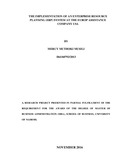| dc.description.abstract | Enterprise resource planning (ERP) system has been one of the most popular business management systems, providing benefits of real-time capabilities and seamless communication for business in large organizations. However, not all ERP implementations have been successful. Since ERP implementation affects entire organizations such as process, people, and culture, there are a number of challenges that companies may encounter in implementing ERP systems. This study was conducted using Survey Research Design. The target population was Europ assistance, USA that adopted ERP systems in the delivery of services. The accessible population of this study was 30 participants who consisted of administrators and heads of ICT from the different EA locations in the USA. Data was collected through the use of questionnaires administered in the field to the sampled respondents. Before processing the responses, the completed questionnaires were sorted, checked and edited for completeness and consistency. The data was then coded to enable the responses to be grouped into various categories. Descriptive statistics technique was used to analyze the quantitative data. The findings were presented using tables, graphs and pie charts and reported on three main classifications which included; summary of main findings, conclusions and recommendations. The study concluded that the decision to implement ERP system was taken by various reasons including: Improvements in processes and better control over them, enhanced quality of processes, predictability of business and business processes become standardized across the whole enterprise, better transparency and improved integration of activities across departments. The study concluded that ERP allows different departments with diverse needs to communicate with each other by sharing the same information in a single system. ERP thus increases cooperation and interaction between all business units in an organization on this basis. Also, ERP standardizes processes and data within an organization with best practices. The company also streamlines data flow between different parts of a business by creating a one-transaction system. The study concluded that Europ Assistance Company did indeed face challenges during the implementation of the ERP System. ERP creates many interconnections among various business processes and data flows to ensure that any other unit of the organisation can obtain information in one part of the business. Information that was previously maintained by different departments must be integrated and made available to the company as a whole. Business processes must be tightly integrated, jobs redefined and new procedures created throughout the company. The whole process of change is challenging and employees are often unprepared for new procedures and roles. For practice, the results demonstrate how ERP implementation projects in Europ Assistance Company USA should consider the unique contextual features of these type organizations. A proper understanding of these contextual issues may lead to a better comprehension of ERP system implementation and thereby contribute to successful ERP implementation. | en_US |



